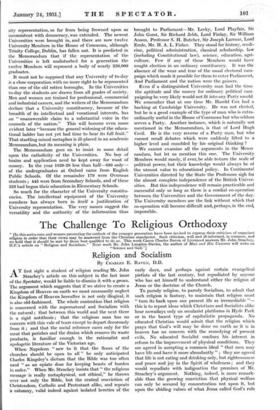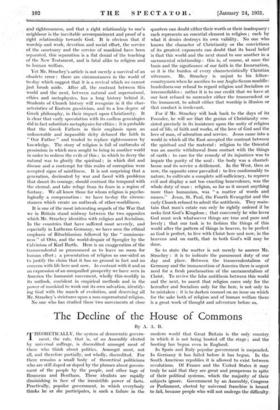The Challenge To Religious Orthodoxy
(In this series men and women presenting the outlook of the younger generation have been invited to express their criticism of organized religion in order that their views may be answered from the Christian standpoint. Such criticism, well and ill-informed, is common, and we hold that it should be met by those best qualified to do so. This week Canon Charles Raven of Liverpool answers Mr. John Strachey, M.P.'s article on " Religion and Socialism." Next week Mr.' John Langdon-Davies, the author of Man and His Universe will write on
"Science and God."]
Religion and Socialism
By CIIARLES E. RAVEN, D.D.
AT first sight a student of religion reading Mr. John Strachey's article on this subject in the last issue of the Spectator, would be liable to dismiss it with a groan. The argument -which suggests that if we strive to create a Kingdom of Heaven on earth we must necessarily neglect the Kingdom of Heaven hereafter is not only illogical, it is also old-fashioned. The whole contention that religion is concerned with the supernatural and Socialism with the natural ; that between this world- and the next there is a rigid antithesis ; that the religious man has no concern with this vale of tears except to depart decorously from it ; and that the social reformer cares only for the meat that perishes and the drains which remove its waste products, is familiar enough in the rationalist and apologetic literature of the Victorian age.
When Napoleon " saw to *it that the floors of the churches should be open to all " he only anticipated Charles Kingsley's dictum that the Bible was too often used " as an opiate dose for keeping beasts of burden in order." When Mr. Strachey insists that " the religious message is really metaphysical, not ethical," he throws over not only the Bible, but the central conviction of Christendom, Catholic and Protestant alike, and repeats a calumny, valid indeed against isolated heretics of the early days, and perhaps against certain evangelical pietists of the last century, but repudiated by anyone who has set himself to understand either the religion of Jesus or the doctrine of the Church.
To parody religion, to parody Socialism, to admit that such religion is fantasy, to maintain that religion must " turn its• back upon our present ills as irremediable "- this is to repeat ideas which Christians and Socialists alike hear nowadays only on secularist platforms in Hyde Park or in the basest type of capitalistic propaganda. No educated Christian would admit that the religion which prays that God's will may be done on earth as it is in heaven has no concern with the remedying of present evils. No educated Socialist confines his interest in reform to the improvement of physical conditions. They are agreed in accepting a common ideal " that men may have life and have it more abundantly " ; they are agreed that life is not eating and drinking only, but righteousness and peace and joy in the Spirit of wholeness ; and they would repudiate with indignation the premises of Mr. Strachey's argument. Nothing, indeed, is more remark- able than the growing conviction that physical welfare can only be secured by concentration not upon it, but upon the abiding values of what Jesus called God's rule and 'righteousness, and that a right relationship to one's neighbour is the inevitable accompaniment and proof of a right relationship towards God. It is obvious that if worship and work, devotion and social effort, the service of the sanctuary and the service of mankind have been separated, this separation is a flat denial of the teaching of the New Testament, and is fatal alike to religion and to human welfare.
Yet Mr. Strachey's article is not merely a survival of an obsolete error : there are circumstances in the world of to-day which suggest that it is a revival which we cannot just brush aside. After all, the contrast between this world and the next, between natural and supernatural, ethics and metaphysics, has a long history behind it. Students of Church history will recognize in it the char- acteristics of Eastern gnosticism, and to a less degree of Greek philosophy, in their impact upon Christianity. It is clear that early speculation with its endless genealogies did in fact substitute metaphysics for ethics it is probable that the Greek Fathers in their emphasis upon an unknowable and impassible deity debased the faith in " Our Father " and tended to replace righteousness by knowledge. The story of religion is full of outbreaks of pessimism in which men sought to bring in another world in order to redress the evils of this ; in which to decry the natural was to glorify the spiritual ; in which dirt and disease and a contempt for this realm of corruption were accepted signs of saintliness. It is not surprising that a generation, decimated by war and faced with problems that daunt its courage, should contrast the temporal with the eternal, and take refuge from its fears in a region of fantasy. We all know those for whom religion is psycho- logically a compensation : we have to-day the circum- stances which create an outbreak of other-worldliness.
It is one of the most interesting sequels of the War that we in Britain stand midway between the two. opposites which Mr. Strachey identifies with religion and Socialism. In the countries that have suffered most severely, and especially in Lutheran Germany, we have seen the ethical emphasis of Ritschlianism followed by the " numinous- ness " of Otto, and the world-despair of Spengler by the Calvinism of Karl Barth. Here is an exaggeration of the transcendental so pronounced as to leave no room for human effort ; a presentation of religion so one-sided as to justify the claim that it has no ground in fact and no concern with life here and now. In contrast with it and as an expression of an unequalled prosperity we have seen in America the humanist movement, wholly this-worldly in its outlook, confident in empirical methods and in the power of mankind to work out its own salvation, identify- ing God with the march of evolution, and deserving all Mr. Strachey's strictures upon a non-supernatural religion.
No one who has studied these two movements at close quarters can doubt either their worth or their inadequacy : each represents an essential element in religion ; each by what it denies destroys its own validity. No one who knows the character of Christianity or the convictions of its greatest exponents can doubt that its basal belief is that this world and the next stand to one another in a sacramental relationship : this is, of course, at once the basis and the significance of our faith in the Incarnation, as it is the burden of every characteristically Christian utterance. Mr. Strachey is unjust to his fellow- countrymen when he ascribes to our Anglo-Saxon muddle-' headedness our refusal to regard religion and Socialism as irreconcilables : rather it is to our credit that we have at our best refused to surrender either the transcendent or the immanent, to admit either that worship is illusion or that conduct is irrelevant.
For if Mr. Strachey will look back to the days of its Founder, he will see that the genius of Christianity con- sisted precisely in its insistence upon the unity of religion and of life, of faith and works, of the love of God and the love of man, of adoration and service. Jesus came into a world in which all the East accepted the contrast between the spiritual and the material : religion to the Oriental was an ascetic withdrawal from contact with the things of earth : to care for the remedy of its injustices- was to impair the purity of the soul : the body was a charnel- house and its service a defilement. In the West, then as now, the opposite error prevailed : to live conformably to nature, to cultivate a complete self-sufficiency, to reprove evil and display a not too exacting benevolence, was the whole duty of man : religion, so far as it meant anything more than humanism, was " a matter of words and names." Jesus, St. Paul, the Fourth Evangelist and the early Church refused to admit the antithesis. They main- tain that man's estate can only be rightly ordered if he seeks first God's Kingdom ; that conversely he who loves God must seek whatsoever things are true and pure and lovely ; that our task is to fashion the things of this world after the pattern of things in heaven, to be perfect as God is perfect, to live with Christ here and now, in the heavens and on earth, that in both God's will may be done.
So to state the matter is not merely to answer Mr. Strachey : it is to indicate the paramount duty of our" day and place. Between the transcendentalism of Germany and the immanentism of America there is urgent need for a fresh proclamation of the sacramentalism of Christ. To revive the false antithesis between this world and the next, to assert that religion cares only for the hereafter and Socialism only for the here, is not only to be mistaken : it is to darken counsel on an issue on which for the sake both of religion and of human welfare there is a great work of thought and adventure before us.







































 Previous page
Previous page